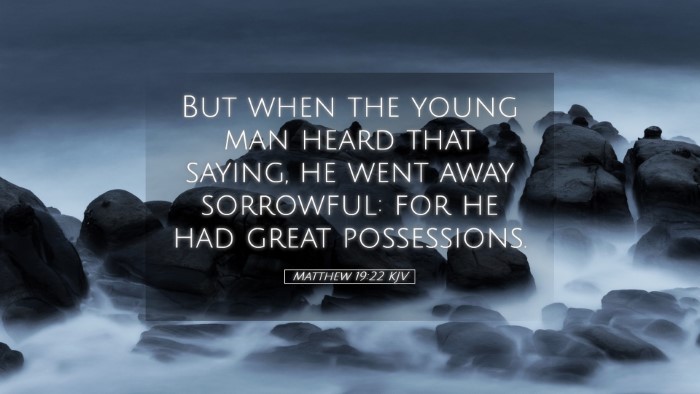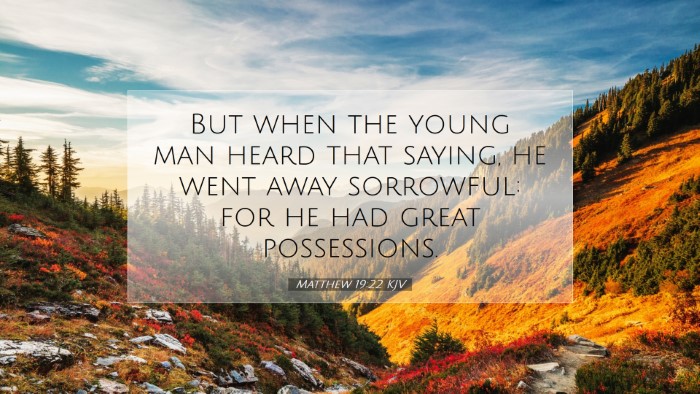Commentary on Matthew 19:22
Matthew 19:22 (KJV): "But when the young man heard that saying, he went away sorrowful: for he had great possessions."
Introduction
This verse reveals a profound encounter between Jesus and a rich young ruler. It encapsulates themes of materialism, spiritual desirability, and the cost of discipleship. The commentary from various public domain scholars offers rich insights into this significant moment in the Gospels.
Contextual Analysis
Matthew 19:22 is part of a broader narrative depicting Jesus' teachings on wealth, the Kingdom of Heaven, and the nature of true discipleship. Prior to this moment, the young ruler approaches Jesus seeking eternal life. His question reflects a desire for assurance and guidance, but the answer provided by Jesus challenges his attachment to worldly possessions.
Insights from Matthew Henry
Matthew Henry emphasizes the internal struggle of the young ruler and the weight of his possessions. He points out that the young man considered the cost of following Jesus but ultimately placed his material wealth above spiritual riches. Henry highlights the sorrow that enveloped the young man’s departure, illustrating the 'sad estate' of one who chooses earthly treasures over eternal ones.
Albert Barnes' Perspective
Albert Barnes elaborates on the specifics of the young man's sorrow. He notes that the term "sorrowful" conveys not just disappointment but a weighty sadness indicative of deeper inner conflict. Barnes indicates that the young man understood the call to sell his possessions, which he recognized as a pivotal moment in his spiritual journey. The sorrow stems from his realization that he must relinquish what he held dear, showcasing the tension between temporal security and eternal hope.
Adam Clarke's Commentary
Adam Clarke provides a thoughtful examination of the young man's predicament, drawing attention to the societal norms and expectations of wealth. He posits that his great possessions may have served as a barrier to a richer spiritual experience. Clarke's commentary invokes the idea that wealth requires a greater responsibility; thus, the young man’s decision illustrates the struggle many encounter when weighing their earthly belongings against spiritual fidelity.
Theological Implications
This pivotal verse prompts theological reflection on the nature of discipleship, the dangers of wealth, and human priorities. It poses essential questions for Christians regarding attachment to material goods and the sincerity of their following Christ.
Discipleship and Sacrifice
In this commentary, we must recognize that true discipleship often requires sacrifice. The rich young ruler's choice to depart in sorrow serves as a stark reminder that following Christ may involve leaving behind what we treasure most. The essence of Jesus' teaching here emphasizes that the Kingdom of Heaven demands priorities that may contrast sharply with worldly views.
The Conflict of Interests
This narrative invokes a deeper discussion of conflicting interests in the believer's life. The tension between holding onto personal wealth and submitting fully to God showcases the true heart condition of those who seek eternal life. Barnes notes that many are like the young ruler, caught in the balance between their desires and the call of Christ. There is a stark realization that earthly possessions can tether one’s heart away from divine pursuits.
Conclusion
Matthew 19:22 serves as a significant instructional moment within the life of Christ. The sorrow of the young ruler reflects a broader human condition and invites pastors, students, and theologians to examine their relationship with material wealth. Each commentary enriches our understanding and urges a questioning of our commitments, reminding us that discipleship necessitates a willingness to confront and often forsake the comforts of this world in pursuit of a greater spiritual inheritance.
Key Takeaways
- The Dilemma of Wealth: The struggle between spiritual devotion and material possessions is a continuing theme in Christian life.
- Pursuit of Eternal Life: True eternal life requires a reevaluation of one's priorities and willingness to forsake worldly ties.
- Value of Sorrow: The young man's sorrow illustrates the deep emotional and spiritual conflict experienced when confronted with the demands of Christ.
- Call to Action: Believers are challenged to assess their own attachments and consider what sacrifices may be necessary in their pursuit of God's Kingdom.


